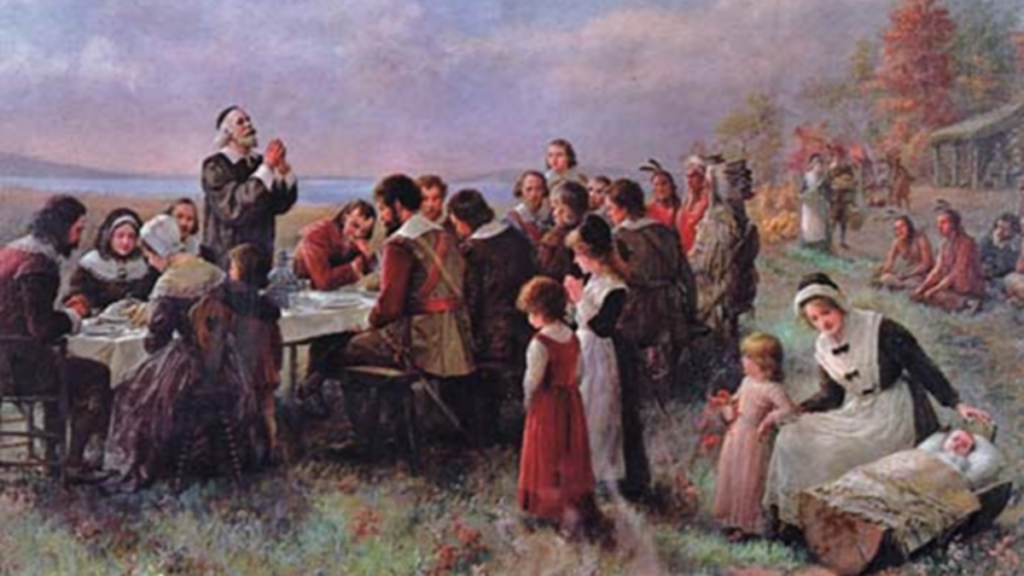Last updated on November 28th, 2022 at 11:17 am
Thanksgiving is about more than gratitude, much more. On December 22, 1820, at Plymouth, Massachusetts on the bicentennial of the landing of the Pilgrims, Daniel Webster proclaimed,
Let us rejoice that we behold this day. Let us be thankful that we have lived to see the bright and happy breaking of the auspicious morn which commences the third century of the history of New England. Auspicious indeed… is the dawn that awakens us to the commemoration of the landing of the Pilgrims…. Forever honored be this, the place of our fathers’ refuge! Forever remembered the day which saw them [arrive], weary and distressed, broken in everything but spirit, poor in all but faith and courage, at last secure from the dangers of wintry seas.
Their courage was chronicled by William Bradford, who recorded that as they had contemplated emigrating to the New World, “It was granted that the dangers were great, but not desperate. The difficulties were many, but not invincible…; and all of them, through the help of God, by fortitude and patience, might either be borne or overcome.” And in preparation for their journey, they held a day of fasting and “pouring out prayers to the Lord with great fervency, mixed with abundance of tears.”
Sailing on a northern route across the Atlantic through treacherous storms, the ship sailed into Cape Cod on November 11, 1620. “Being thus arrived in a good harbor and brought safe to land,” Bradford reported, “they fell upon their knees and blessed the God of Heaven who had brought them over the vast and furious ocean, and delivered them from all the perils and miseries thereof.”
A scouting party was sent out to find a suitable place to settle, and on December 21, the Pilgrims—using the term Bradford himself used: “they knew they were pilgrims”—stepped ashore at Plymouth. As recounted on the website of the Mayflower Project,
They were full of hope making a better life for themselves and their children, while being able to worship freely and in peace. Undoubtedly the most famous colonists in world history, their faith and fortitude are legendary. Their perseverance laid the cornerstone of a new Nation. The Pilgrims’ courage, gratitude to God, and love for one another still inspire people today. The story of Mayflower and her tumultuous trans-Atlantic crossing, Plymouth Colony, with its tragic first winter, treaty with the Wampanoag People and celebrated First Thanksgiving, echoes down the ages and around the world. Regardless of anything that came before or after, Plymouth is the “once upon a time” to the story of the United States— the symbolic, if not literal, birthplace of our Nation…. [They] created a new society… [and] crafted a region rich in intellect, spirituality, self-government and commerce; a place of creative splendors whose influence on American culture and the world is inestimable.
Honoring the legacy of those courageous Pilgrims has brought peace and prosperity to America on a scale never before seen in history. But America is now lapsing into the historical phenomenon once described by the Florentine thinker Niccolo Machiavelli (as here summarized by Sebastian de Grazia) when “one generation does not remember what the previous one suffered and learned and transmitted in principles of law, custom, and religion.”
Too long a time has passed without concern for fundamental beliefs: “men begin to vary customs and transgress the laws.”… Men slide away from the fundaments of their religious and political communities and need every now and then to be reminded, as Niccolo once phrases it, “to go back toward the target.” True of kingdoms and religions, this is true even of republics, where one… might expect that liberty is never forgotten, “where the public buildings, the places of the magistrates, the insignia of free institutions recall it.”
Today as America’s buildings and courtrooms and currency still proclaim “In God We Trust,” freedom of speech and religion are under unprecedented attack even as our Pilgrim legacy is being discarded and denigrated. In a “woke” culture when those standing for faith and freedom and family run the risk of being “cancelled,” the Pilgrims’ example calls to us across the centuries. “This nation came into being,” said Ezra Taft Benson, through “sacrifice, labor, and struggle. Brave Americans gave their lives in the settlement of this nation—and in its preservation. Let us remember our heritage and recognize that the day of courage, labor, and sacrifice is never done.”
